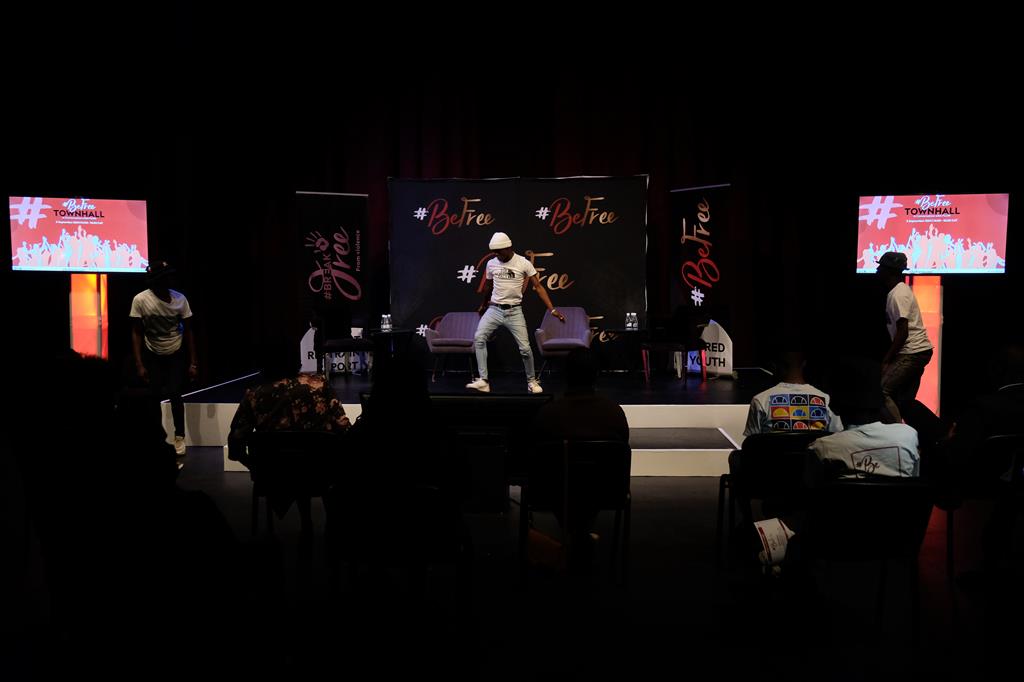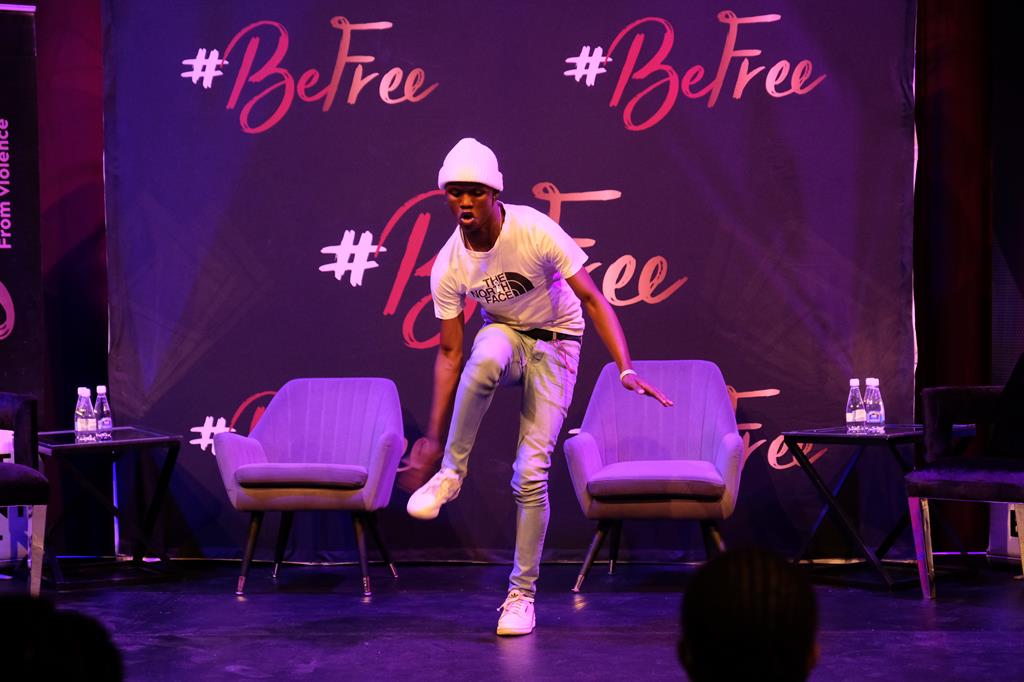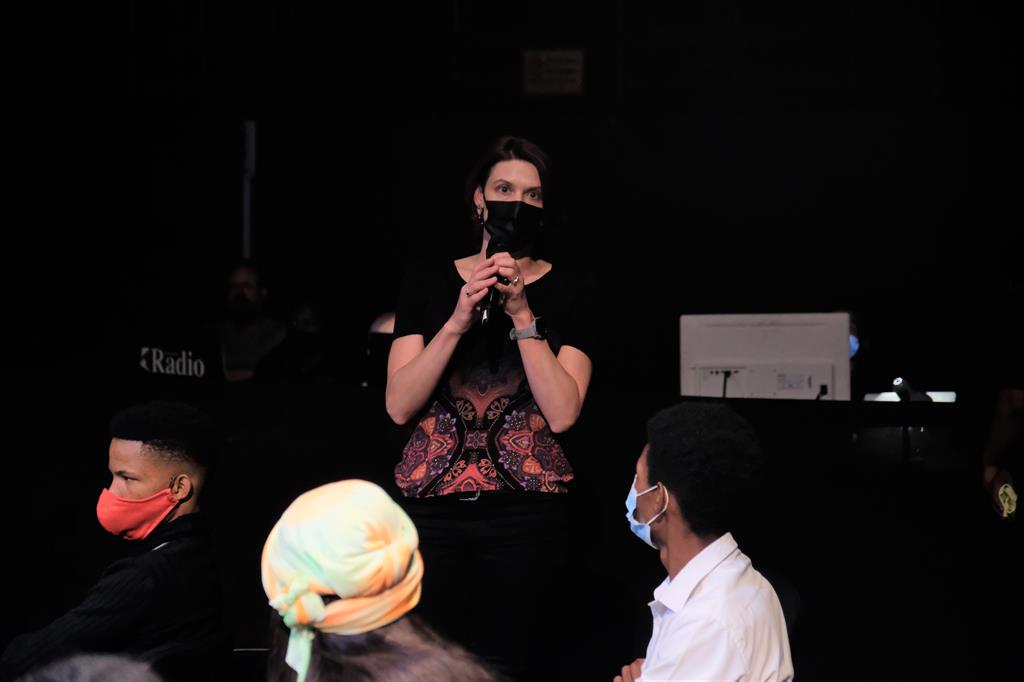Let’s talk about it
Intergenerational dialogue with young people touches on impacts of the coronavirus on the youth of Namibia.
Monique Adams
On Thursday, 2 September, the Office of the First Lady and One Economy Foundation facilitated an intergenerational dialogue with young people.
This dialogue looked at how the pandemic has affected issues such as teen pregnancy, substance abuse, mental health and access to key sexual reproductive health services among young people.
Covid-19 impacts the youth
Education – social coping mechanisms – learners’ perspective:
Interacted on social media platforms, where they would engage on Instagram, Twitter and Tik-Tok.
Humorous mechanisms would look like meeting up and sharing funny videos.
Active mechanisms, where the youth would motivate each other; for example, by encouraging each other to get up and do something.
In order to complete tasks given by teachers, it has been difficult for learners to find a place to complete these tasks.
Pressure to write exams with a syllabus that is not finished.
Teachers died and were not replaced, especially teachers who teach languages.
Fear of writing exams they are not prepared for, which will in the end cause high failing rates.
Learning from home was extremely difficult as you had your peers who dropped out of school come over and invite you to hang out, distracting you from your school work.
The loss of family members at home caused mental and emotional turmoil.
Covid-19 caused peers to drop out of school because the influence from learners who already dropped.
Teachers’ perspective:
Teaching a learner who got infected with the virus made it difficult because teaching can only resume after the classroom has been disinfected.
The emotional burden makes doing our job difficult because we need to always stay positive and be strong for our learners.
Patience was one thing that was greatly tested because with the trauma, everyone has their own way of taking in the learning process.
Resources have become scarce as before the pandemic it was okay for more than three learners to share a textbook, but now that cannot happen, causing a strain on the school and the teaching experience.
Parents’ perspective:
As a parent, seeing your child go through the mixed emotions of wanting to go to school one day and the next not wanting to step foot on school premises, that affects the parent in not knowing how to help their child.
Learners having school from home brought the fear of their child getting into drugs or becoming pregnant.
As parents, we are also in pain because your dream is for your child to become someone in life but due to the pandemic, your child drops out of school.
First Lady Monica Geingos thanked the teachers for co-parenting the learners during difficult times, and applaued single parents for trying their best and being there for their children.
Psychiatrist Dr Belinda Bruwer mentioned that what she has seen is that the youth are very resilient and staying creative helps because right now you are part of history, meaning that things are going to take a bit longer.
But in the meantime, make sure you get enough sleep, exercise, make time to have fun with friends and try eating healthy.
MENTAL HEALTH
A learner from a Windhoek high school, shared her journey of getting raped by her father last year., shared her journey of getting raped by her father last year. She spoke to her life skills teacher at school, and then told her mother that she would like to continue going to school regardless of the situation. Her register teacher reached out to her, asking if she is doing okay with all the bullying happening to her and she told her teacher that the bullies will always be there but she is going to make sure she passes and focus on her studies.
Women and children have also experienced increased domestic violence and abuse. Widespread misinformation about Covid-19 and its prevention measures and deep uncertainty about the future are additional sources of distress. The fact that people may not have the opportunity to say goodbye to loved ones and may not be able to hold funerals for them further contributes to distress.
People who previously coped well with difficult situations can now be less able to do so because of the multiple stressors generated by the pandemic. Those who had experiences of anxiety and distress beforehand may experience an increase in number and intensity of these and some could have developed a mental health condition. Additionally, some may experience the worsening of a previous mental health condition and reduced functioning.
Some suggestions by the World Health Organisation:
Try to use helpful coping strategies such as ensuring you get enough rest, eating sufficient and healthy food, engaging in physical activity, and staying in contact with family and friends. Avoid unhelpful coping strategies such as the use of tobacco, alcohol or other drugs, or spending time on potentially addictive behaviours such as online gaming. In the long-term, these can worsen your mental and physical well-being.
Stay connected and maintain your social networks. Try as much as possible to keep your personal daily routine or create new routines if circumstances change. If health authorities have recommended limiting your physical social contact to contain the outbreak, you can stay connected via telephone or electronically.
Honour healthcare workers supporting people affected with Covid-19 in your community. Acknowledge the role they play in saving lives and keeping people safe. Some healthcare workers may experience avoidance due to stigma or fear, which can make an already challenging situation far more difficult.
As these dialogues happen every year, the #BeFree Movement is 100% sure that this is something that will be growing to international levels.
If you missed the live dialogue, check it out here: https://fb.watch/7_NxbX5Eek/
On Thursday, 2 September, the Office of the First Lady and One Economy Foundation facilitated an intergenerational dialogue with young people.
This dialogue looked at how the pandemic has affected issues such as teen pregnancy, substance abuse, mental health and access to key sexual reproductive health services among young people.
Covid-19 impacts the youth
Education – social coping mechanisms – learners’ perspective:
Interacted on social media platforms, where they would engage on Instagram, Twitter and Tik-Tok.
Humorous mechanisms would look like meeting up and sharing funny videos.
Active mechanisms, where the youth would motivate each other; for example, by encouraging each other to get up and do something.
In order to complete tasks given by teachers, it has been difficult for learners to find a place to complete these tasks.
Pressure to write exams with a syllabus that is not finished.
Teachers died and were not replaced, especially teachers who teach languages.
Fear of writing exams they are not prepared for, which will in the end cause high failing rates.
Learning from home was extremely difficult as you had your peers who dropped out of school come over and invite you to hang out, distracting you from your school work.
The loss of family members at home caused mental and emotional turmoil.
Covid-19 caused peers to drop out of school because the influence from learners who already dropped.
Teachers’ perspective:
Teaching a learner who got infected with the virus made it difficult because teaching can only resume after the classroom has been disinfected.
The emotional burden makes doing our job difficult because we need to always stay positive and be strong for our learners.
Patience was one thing that was greatly tested because with the trauma, everyone has their own way of taking in the learning process.
Resources have become scarce as before the pandemic it was okay for more than three learners to share a textbook, but now that cannot happen, causing a strain on the school and the teaching experience.
Parents’ perspective:
As a parent, seeing your child go through the mixed emotions of wanting to go to school one day and the next not wanting to step foot on school premises, that affects the parent in not knowing how to help their child.
Learners having school from home brought the fear of their child getting into drugs or becoming pregnant.
As parents, we are also in pain because your dream is for your child to become someone in life but due to the pandemic, your child drops out of school.
First Lady Monica Geingos thanked the teachers for co-parenting the learners during difficult times, and applaued single parents for trying their best and being there for their children.
Psychiatrist Dr Belinda Bruwer mentioned that what she has seen is that the youth are very resilient and staying creative helps because right now you are part of history, meaning that things are going to take a bit longer.
But in the meantime, make sure you get enough sleep, exercise, make time to have fun with friends and try eating healthy.
MENTAL HEALTH
A learner from a Windhoek high school, shared her journey of getting raped by her father last year., shared her journey of getting raped by her father last year. She spoke to her life skills teacher at school, and then told her mother that she would like to continue going to school regardless of the situation. Her register teacher reached out to her, asking if she is doing okay with all the bullying happening to her and she told her teacher that the bullies will always be there but she is going to make sure she passes and focus on her studies.
Women and children have also experienced increased domestic violence and abuse. Widespread misinformation about Covid-19 and its prevention measures and deep uncertainty about the future are additional sources of distress. The fact that people may not have the opportunity to say goodbye to loved ones and may not be able to hold funerals for them further contributes to distress.
People who previously coped well with difficult situations can now be less able to do so because of the multiple stressors generated by the pandemic. Those who had experiences of anxiety and distress beforehand may experience an increase in number and intensity of these and some could have developed a mental health condition. Additionally, some may experience the worsening of a previous mental health condition and reduced functioning.
Some suggestions by the World Health Organisation:
Try to use helpful coping strategies such as ensuring you get enough rest, eating sufficient and healthy food, engaging in physical activity, and staying in contact with family and friends. Avoid unhelpful coping strategies such as the use of tobacco, alcohol or other drugs, or spending time on potentially addictive behaviours such as online gaming. In the long-term, these can worsen your mental and physical well-being.
Stay connected and maintain your social networks. Try as much as possible to keep your personal daily routine or create new routines if circumstances change. If health authorities have recommended limiting your physical social contact to contain the outbreak, you can stay connected via telephone or electronically.
Honour healthcare workers supporting people affected with Covid-19 in your community. Acknowledge the role they play in saving lives and keeping people safe. Some healthcare workers may experience avoidance due to stigma or fear, which can make an already challenging situation far more difficult.
As these dialogues happen every year, the #BeFree Movement is 100% sure that this is something that will be growing to international levels.
If you missed the live dialogue, check it out here: https://fb.watch/7_NxbX5Eek/













Comments
Namibian Sun
No comments have been left on this article